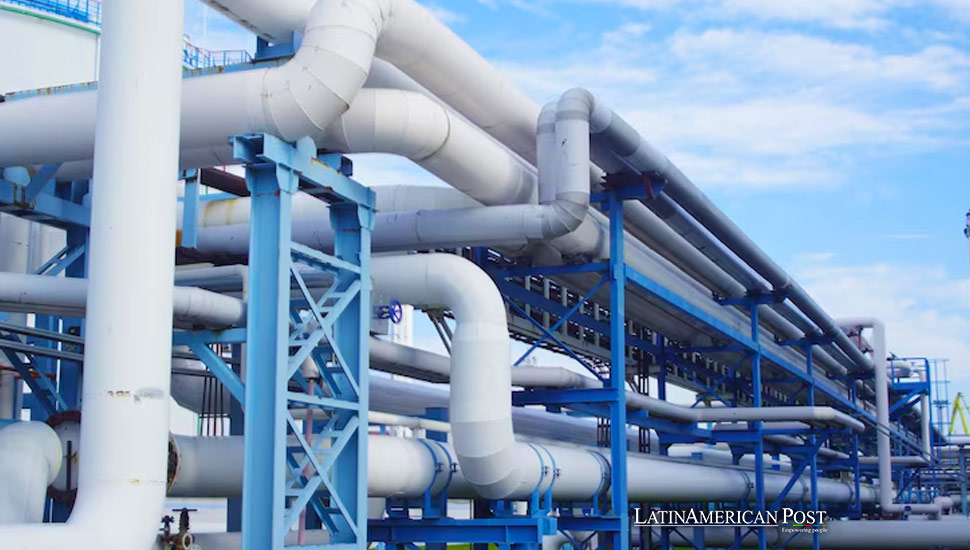Bolivia’s Strategic Move: Transporting Argentine Gas to Brazil Efficiently

Bolivia’s state oil company YPFB announces a strategic initiative to transport Argentine natural gas to Brazil, leveraging its robust infrastructure. This move underscores Bolivia’s critical role in the regional energy market, fostering economic cooperation amidst complex political dynamics.
The President of the Bolivian state oil company Yacimientos Petrolíferos Fiscales Bolivianos (YPFB), Armin Dorgathen, announced a significant initiative this Tuesday, highlighting Bolivia’s potential to transport natural gas from Argentina to Brazil. Dorgathen emphasized that Bolivia’s established and unparalleled infrastructure positions it as a vital player in the regional energy market.
Starting in October, Bolivia will transport 3 million cubic meters per day (MMm3d) of Argentine gas to the Brazilian market. Dorgathen made this announcement during a press conference in La Paz and outlined the strategic advantages of this arrangement.
Oscar Guzmán, YPFB’s transportation manager, underscored Bolivia’s capability to offer an immediate, efficient, and competitive solution for transporting gas. Dorgathen clarified that while the proposal to lease the infrastructure to Argentina for export to Brazil has yet to be formally accepted, it represents a significant opportunity. “We are simply showcasing all the infrastructure we have to carry out this task,” Dorgathen stated.
Argentina and Brazil are interested, but regulatory and economic details need to be resolved in both countries before the plan can proceed. There are also potential risks, such as political tensions and changes in market conditions, that could affect the success of the initiative. Meanwhile, Argentina is progressing with its gas pipeline projects, such as the reversal of the northern pipeline system and the implementation of the Presidente Néstor Kirchner gas pipeline (GPNK), aimed at increasing gas transport to Brazil.
Bolivian Gas: A Historical Backbone of Economic Growth
Bolivia’s natural gas has been a cornerstone of its economy for the past two decades, with Brazil and Argentina being the primary markets. However, recent years have seen a decline in both production and revenues. Bolivia’s natural gas production dropped from 56.6 million cubic meters per day (Mmcd) in 2016, with a petroleum revenue of $1.755 billion, to 31.9 Mmcd in 2023, generating $2.048 billion in revenue.
In April, President Luis Arce faced criticism from the opposition after stating that “the gas is exhausted” in Bolivia, attributing the situation to previous administrations. However, despite the decline in production, the state oil company assures Bolivia’s gas supply is not only sufficient to meet domestic demand but also export commitments to Argentina and Brazil, providing a reassuring sense of Bolivia’s energy security.
Bolivia’s proposal comes amidst a strained relationship with Argentina, exacerbated by ideological differences and controversial statements. In April, Argentina’s Security Minister Patricia Bullrich claimed the presence of 700 Iranian soldiers in Bolivia, prompting a strong rebuttal from the Bolivian Foreign Ministry, which demanded a retraction. These political tensions could potentially impact the acceptance and implementation of the gas transport offer. Despite these challenges, YPFB’s President Dorgathen emphasized that the offer is purely commercial and unrelated to political disputes. This pragmatic approach highlights Bolivia’s commitment to strengthening regional energy cooperation, regardless of diplomatic challenges.
Despite these political tensions, YPFB’s President Dorgathen emphasized that the gas transport offer is purely commercial and unrelated to political disputes. This pragmatic approach highlights Bolivia’s commitment to strengthening regional energy cooperation, regardless of diplomatic challenges.
Expanding Capacities and Regional Integration
Bolivia’s ability to initially transport 3 MMm3d of gas can be scaled up to 20 MMm3d, contingent on increasing interest from neighboring countries. This ambitious plan signifies Bolivia’s strategic role in the regional energy market and its potential to enhance energy security in South America.
In a broader Latin American context, this initiative reflects the region’s complex energy dynamics and the interplay between natural resources and geopolitics. Bolivia’s move to transport Argentine gas to Brazil underscores its strategic positioning and highlights the intricate interdependencies within the region’s energy sector.
Natural gas has been pivotal to Bolivia’s economic stability, providing a substantial portion of the country’s export revenues. The proposed transport of Argentine gas through Bolivian infrastructure could reinforce this economic pillar, fostering growth and regional integration. This initiative could also lead to increased revenue for Argentina through gas exports and for Brazil through enhanced energy security. However, the success of this venture will depend on navigating the regulatory and economic landscapes of both Argentina and Brazil.
As Bolivia continues exploring and developing its gas reserves, its role as a key energy player in Latin America remains critical. The country’s ability to leverage its established infrastructure for regional benefit showcases Bolivia’s strategic vision and commitment to fostering economic stability through energy cooperation. This initiative could also enhance Bolivia’s energy security by diversifying its gas export destinations and reducing its dependence on a single market, such as Brazil or Argentina.
Bolivia’s Strategic Vision for the Future
Bolivia’s offer to transport Argentine gas to Brazil represents a strategic vision for regional energy integration and economic cooperation. This initiative could potentially lead to a more stable and competitive energy market in Brazil and Argentina, with the increased supply of gas potentially lowering energy prices. Bolivia aims to reinforce its position as a vital energy hub in Latin America by capitalizing on its established infrastructure. Despite diplomatic challenges, the focus on commercial opportunities underscores a pragmatic approach to fostering regional collaboration.
Also read: Miss Universe Sheynnis Palacios Visits Bolivia and Promotes Charity
As Latin America continues to navigate complex energy dynamics, Bolivia’s initiative highlights the importance of strategic infrastructure and regional cooperation in achieving energy security and economic growth. This move not only benefits Bolivia but also strengthens the interconnectedness of the South American energy market, paving the way for a more integrated and prosperous future.





